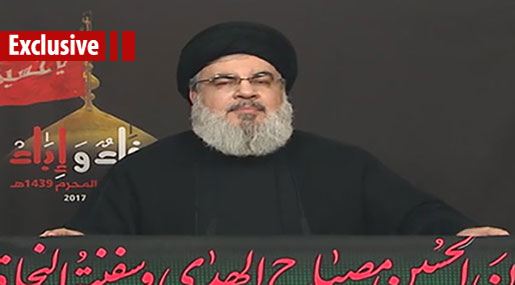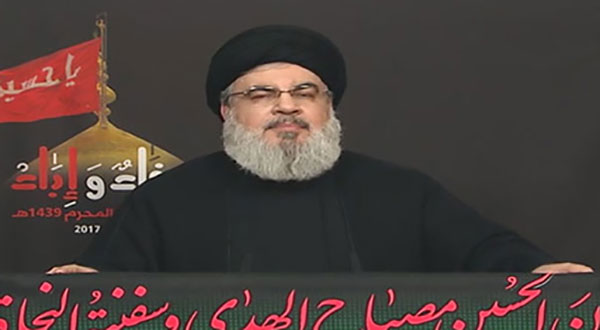
Sayyed Nasrallah’s Speech: Tel Aviv Is Unable To Assess the Strategic Position

Mohammad Ali Jaafar
The silence of the decision-making circles in Tel Aviv and the military and strategic experts' inability to respond to Sayyed Hassan Nasrallah's speech two days ago is not surprising.

Some of the brains of the psychological warfare attribute this silence to a study of the situation and reading the general features of the speech's dimensions, which is considered logical. Sayyed's speech carried many surprises that the "Israelis" were expecting. This is what led them to tread carefully when issuing any assessment of any strategic position that may show weaknesses or confusion. How can Hezbollah's success in managing the transformations in the region be used in the service of its interest in the conflict? How did Sayyed Nasrallah assess the strategic position?
What should be said before the analysis: between the success of Hezbollah and the failure of the "Israeli" entity
There is no doubt that the conflict ended with a number of results that must be mentioned. The most important of which are briefly mentioned:
First, it must be understood that Hezbollah has the ability to accurately assess military and security positions. This is what experience has proven. On this basis, the options are determined. Let us say that Sayyed Nasrallah announced Hezbollah's position based on a strategic assessment, prompting him to go further to discuss and hint at the possible options.
Second, there must be certainty that the "Israeli" leadership is seeking to exploit any weakness that might emerge from Hezbollah on the military and security levels. This has not yet happened. It seems that it will not happen in light of the high ability of the party's leadership in managing the conflict by turning the risks into opportunities. The party was able to transform efforts to weaken it on several fronts to an equation of activating the conflict with the "Israeli" army.
Third, there must be a conviction that the history of the conflict between Hezbollah and the "Israeli" army reveals an error on the part of Tel Aviv in understanding Hezbollah's approach to war. This led to erroneous assessments by the military leadership with regards to Hezbollah's actions and reactions. Perhaps one of the most important was the failure of Tel Aviv to anticipate Hezbollah's entry into the war in Syria and the resulting repercussions.
Fourth, it is becoming increasingly clear that Hezbollah's strategy in the conflict with the "Israeli" army is a defensive strategy, which is aimed at creating deterrence and prevents aggression. It is not contradicted by the party's future use of offensive military tactics for defensive purposes (defensive attack).
Sayyed Nasrallah assesses the situation:
There were several signs that placed the "Israeli" entity in the game of assessments. Sayyed Nasrallah chose accurate words to form clear messages on any of the possible scenarios. What did Sayyed Nasrallah's strategic position hold?
First, in an attempt to confirm the readiness of Hezbollah, Sayyed Nasrallah recalled the strategic dimensions of Hezbollah's combat experience in Syria. It resulted in introducing equations and balances of a new force. Strategic experts and observers are aware of the size of the regional players, especially in terms of surplus power, which is owned by Hezbollah on the level of military operations and planning.
Second: Sayyed highlighted the equation of multiple fronts, which has many implications from a military point of view. Here, Hezbollah wanted to emphasize that the outcome of the Syrian war and the dimensions of these regional consequences mean that the resistance group will not be in a weakened position in the event of an "Israeli" war. The new equations open the possibility of activating several fronts.
Third, Hezbollah wanted to emphasize the structural contradiction in the "Israeli" army. While the "Israeli" leadership seeks to highlight the scope of its power, the reality of the "Israeli" society shows ideological and demographic weaknesses that would lead to its downfall in any future war. This includes actual military confrontations and psychological warfare.
Fourth, Hezbollah reiterated the scenario of a military defensive attack. This is what Sayyed Nasrallah hinted at when he reminded the "Israeli" side of the maneuvers the "Israeli" army launched, which simulated the entry of Hezbollah forces into "Israeli" settlements.
Hence, between the psychological war or the impending war, Hezbollah's secretary-general put the conflict with the "Israeli" army into the tunnel that Hezbollah wants. This highlights the extent of the party's ability to manage the conflict with Tel Aviv.
Let us say that "Israeli" minds are right to be confused in assessing the situation. While some consider the words of Sayyed as part of a psychological war, and others stress that they are the words of "someone planning to fight a war he sees imminent", Tel Aviv finds itself facing clear outcomes. Sayyed Nasrallah has given it only two options: either to accept the existential threat or surrender to the new equations of conflict.
Source: Al-Ahed



